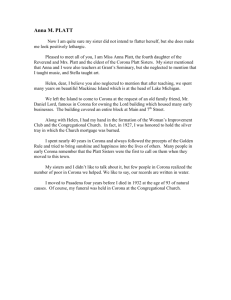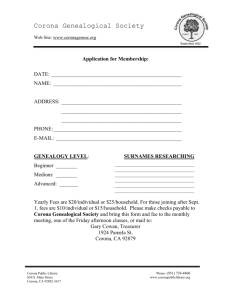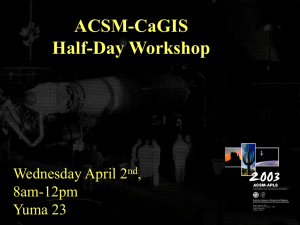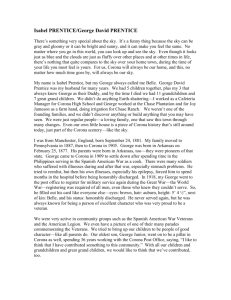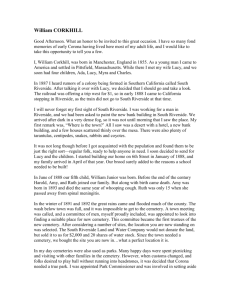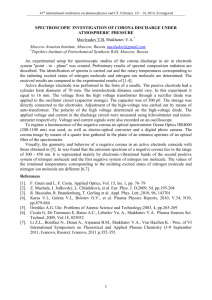Helen C. Platt - Corona Genealogical Society
advertisement
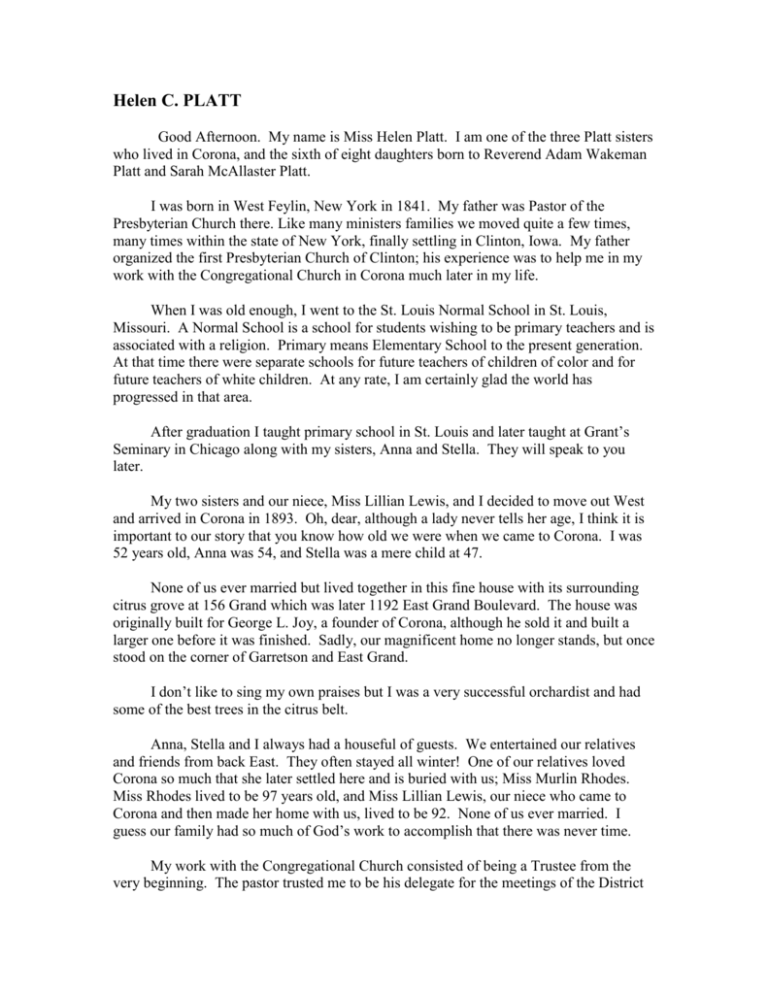
Helen C. PLATT Good Afternoon. My name is Miss Helen Platt. I am one of the three Platt sisters who lived in Corona, and the sixth of eight daughters born to Reverend Adam Wakeman Platt and Sarah McAllaster Platt. I was born in West Feylin, New York in 1841. My father was Pastor of the Presbyterian Church there. Like many ministers families we moved quite a few times, many times within the state of New York, finally settling in Clinton, Iowa. My father organized the first Presbyterian Church of Clinton; his experience was to help me in my work with the Congregational Church in Corona much later in my life. When I was old enough, I went to the St. Louis Normal School in St. Louis, Missouri. A Normal School is a school for students wishing to be primary teachers and is associated with a religion. Primary means Elementary School to the present generation. At that time there were separate schools for future teachers of children of color and for future teachers of white children. At any rate, I am certainly glad the world has progressed in that area. After graduation I taught primary school in St. Louis and later taught at Grant’s Seminary in Chicago along with my sisters, Anna and Stella. They will speak to you later. My two sisters and our niece, Miss Lillian Lewis, and I decided to move out West and arrived in Corona in 1893. Oh, dear, although a lady never tells her age, I think it is important to our story that you know how old we were when we came to Corona. I was 52 years old, Anna was 54, and Stella was a mere child at 47. None of us ever married but lived together in this fine house with its surrounding citrus grove at 156 Grand which was later 1192 East Grand Boulevard. The house was originally built for George L. Joy, a founder of Corona, although he sold it and built a larger one before it was finished. Sadly, our magnificent home no longer stands, but once stood on the corner of Garretson and East Grand. I don’t like to sing my own praises but I was a very successful orchardist and had some of the best trees in the citrus belt. Anna, Stella and I always had a houseful of guests. We entertained our relatives and friends from back East. They often stayed all winter! One of our relatives loved Corona so much that she later settled here and is buried with us; Miss Murlin Rhodes. Miss Rhodes lived to be 97 years old, and Miss Lillian Lewis, our niece who came to Corona and then made her home with us, lived to be 92. None of us ever married. I guess our family had so much of God’s work to accomplish that there was never time. My work with the Congregational Church consisted of being a Trustee from the very beginning. The pastor trusted me to be his delegate for the meetings of the District Congregational Association and the Home Missionary Society. I loved visiting and learning from other Congregational Churches. Even though I was busy entertaining family, learning the art of citrus faming, serving on the school board and serving my church, I saw the need for the women of Corona to unite and started the Woman’s Improvement Club. In 1898 I sent a letter to certain ladies of Corona proposing a meeting to form “A Town Improvement Association of Corona”, and the Woman’s Improvement Club was created. For the first 15 years we held meetings in the members’ homes, but three years after I died the current Club House (a replica of an old Welsh church) was completed. It is the only building in Corona to be on the National Register being built in 1913! Of the many important positions I held in the Woman’s Improvement Club, I am most proud of being in charge of planting the pepper trees on Main Street. You have no idea how that spruced up the dry, desolate area. The Woman’s Improvement Club certainly did improve Corona. We encouraged the City Council to establish a permanent library, a library board and to set up the first Humane Society. We spent many afternoons telling stories to public school children, and I declared my support for Woman’s Suffrage. When the City Council said they couldn’t find the money to clean our streets and alleys, we brought out our brooms and dust pans and did the work ourselves. When some of the council men’s wives joined our work force, money was discovered for street cleaning, after all. In the winter of 1910 my heart failed; I was 69 years old. My sisters donated a large round stained glass window to the Congregational Church in my memory which is still there today.
